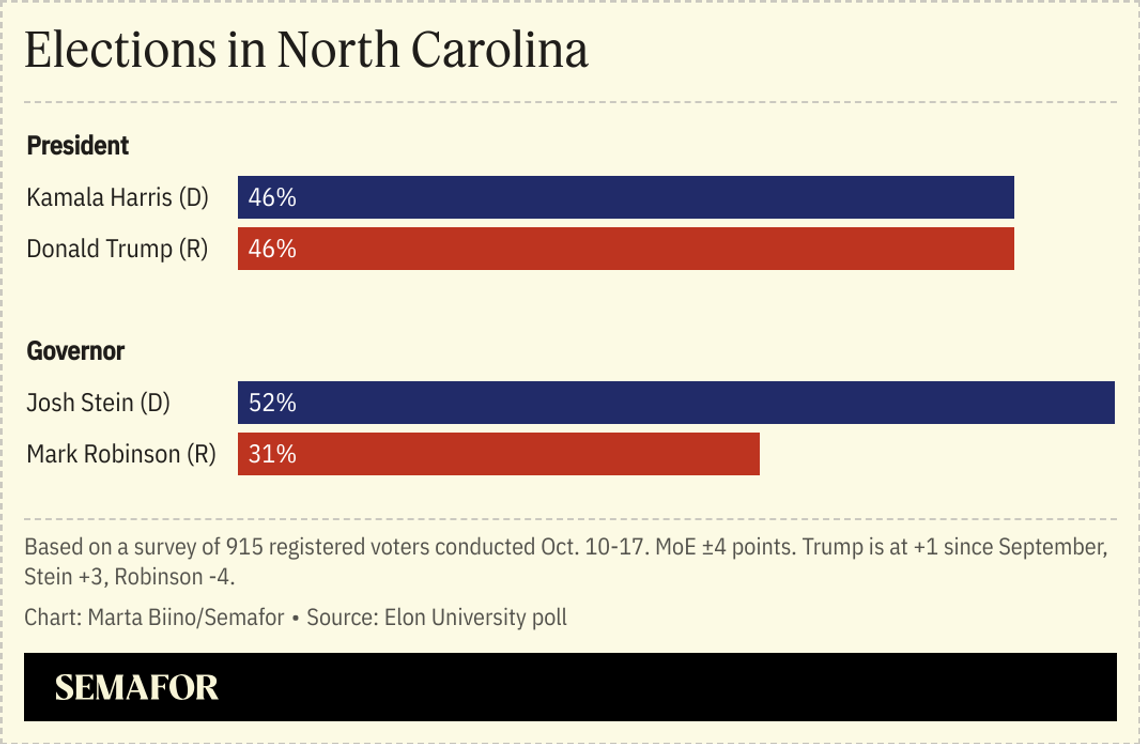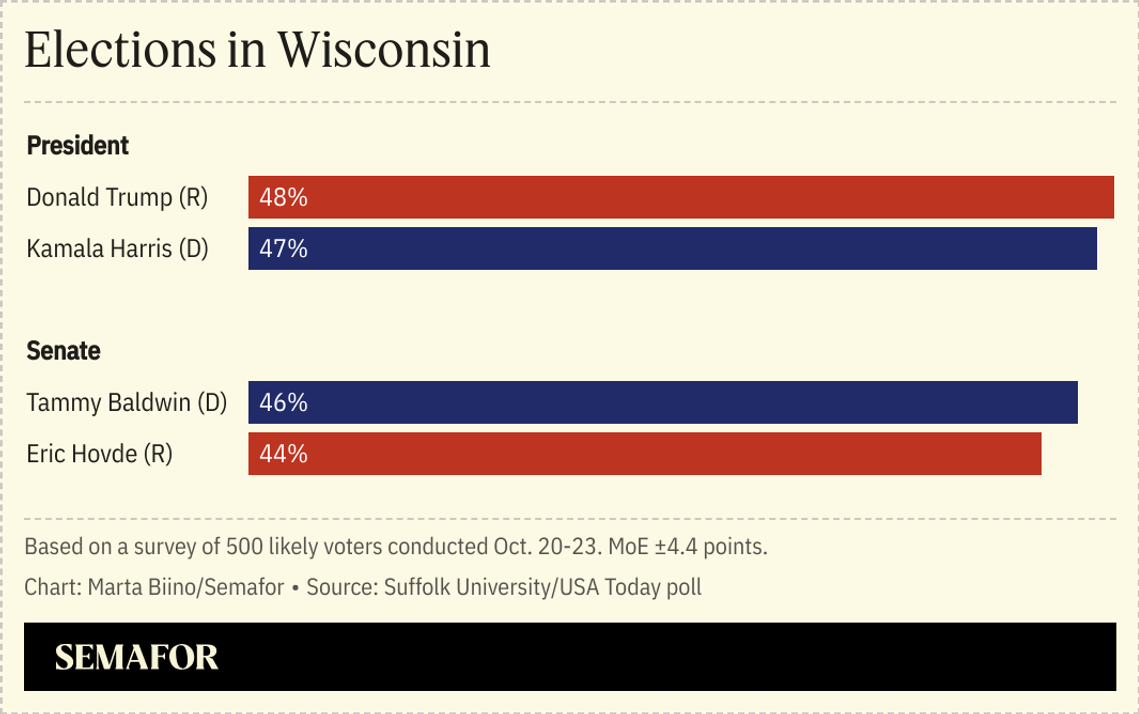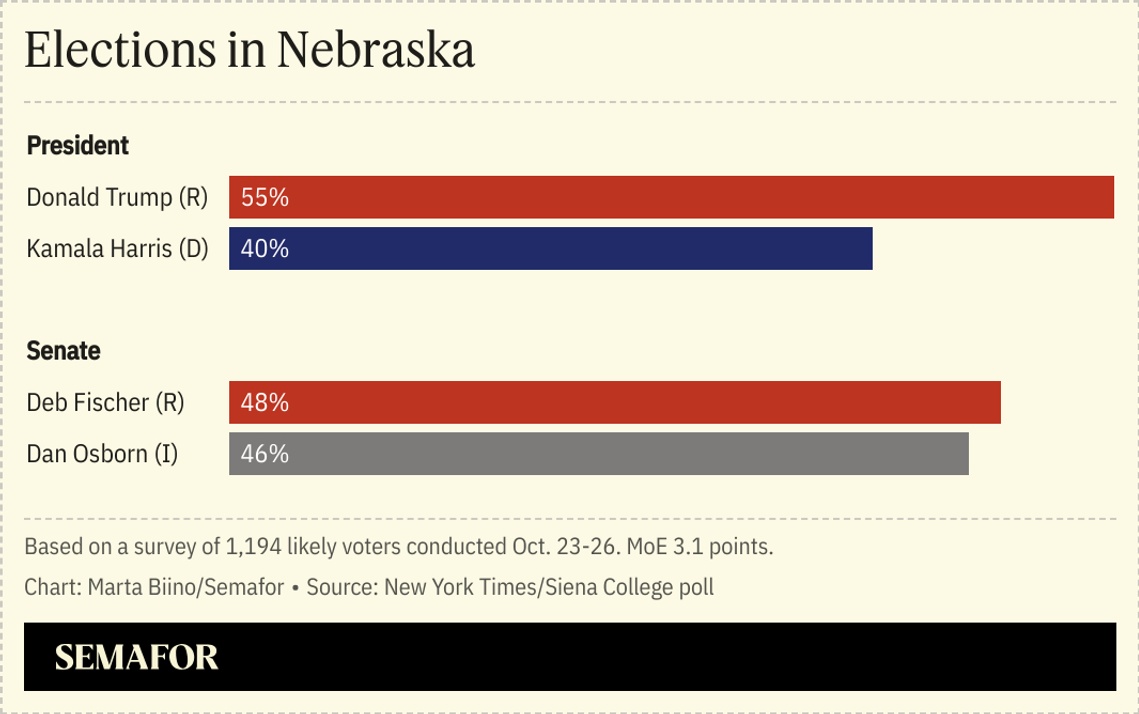 Polls Split-ticket voting is dead; long live split-ticket voting. Republican worries about Lt. Gov. Mark Robinson dragging down Donald Trump, based on old posts CNN discovered from the Nude Africa forum, have not borne out in polling. Support for Robinson has collapsed, with one-in-five independents and one-in-10 Republican voters now saying they’re undecided on the race. Support for Trump has remained stable, and a slight plurality of independents disapprove of the federal response to Hurricane Helene. The question raised by these numbers is whether Republicans vote the full ballot after skipping Robinson. In every statewide race polled, Democrats now hold a lead — but the same was true in most 2020 polling of the state, when Republicans over-performed here.  The first and last Suffolk poll of Wisconsin finds two tied races, with a twist: Democrats overperforming in Door County, a bellwether that numerous reporters have trekked through for clues about what’s going to happen. Statewide, both Trump and Hovde have dragged down the Democrats’ favorable ratings, erasing the advantage that other pollsters have found here for Harris and Baldwin. In Door County, growing more quickly than other rural Wisconsin counties — thanks to its popularity as a retirement hub — the Democrats are far more personally popular. It’s a small sample, but an indication that the uneven shifts in partisan support from 2020 will mean fewer Election Night tea leaves.  As bullish as Republicans feel right now, as they talk about a landslide that could sweep Democrats out of Minnesota and New Mexico, most polling still finds a big Democratic advantage in the suburbs that trended left after 2016. Omaha is ground zero. Harris now leads by 12 points in the Omaha-based 2nd Congressional District, comparable to her advantage in New Jersey. Osborn, whose independent campaign is backed by Democrats, leads there by 18 points, and leads in the 1st District (which includes the state capital and the University of Nebraska) by 9 points; Harris trails narrowly there, two years after the Dobbs backlash shrank the GOP’s margin in a special House election. Republicans lead because of their overwhelming strength in the rural 3rd District, where Trumps leads by a 3-1 margin. Ads Kamala Harris/YouTube Kamala Harris/YouTube- Harris for President, “Your Family.” Here’s an example of the economy-first ads that Democrats are closing with, with few ads rebutting Republican attacks directly. Harris speaks straight into camera about her most popular and well-known plans — against price gouging, for “middle class tax cuts” and cheaper health care — and admits that the viewer “may not always agree with me.” That encapsulates the Democratic strategy, to keep mentioning the party’s basic plans and wave all the negativity off as trivia.
- Donald J. Trump for President 2024, “Four More.” The Trump campaign has run a series of closing spots, at different lengths, with the same basic message: “Kamala broke it” and only he can be trusted to fix it. Each tells the story with headlines pulled off of legacy news sites, sometimes out of context. (A CBS News story cited here as “Harris would raise taxes” actually says “Harris would raise taxes on high-income earners.”) The glue is Harris’ interview on The View and refusal to name a Biden decision she wouldn’t have made.
- Don Bacon for Congress, “Don and Ann.” Even in districts won by Joe Biden, few Republican members of Congress have done more to advertise a bipartisan mindset than Bacon. In 2020, he got the endorsement of Brad Ashford, the Democrat he beat in 2016, over a progressive who stopped Ashford in their party’s primary. This time, he has the support of Ann Ashford, the ex-congressman’s widow, who also ran and lost to Bacon in 2020. “Character matters more than party,” says Bacon. “Don’s no extremist,” says Ashford, joined by a mini-army of women. Their appearance underscores his strength and how Trump — and the unsuccessful effort to stop giving Omaha an electoral vote, which Bacon supported — has undercut it.
Scooped!Daniel Nichanian’s Bolts is always publishing smart, ground-level stories about political developments that might get lost in the news cycle. I’d been wondering if any Ohio voters were befuddled by how Republicans wrote the ballot language for an anti-gerrymandering amendment, describing a non-partisan redistricting commission as “gerrymandering.” Sure enough, Bolts found a voter thrown by the ballot description, which claimed that Ohio would be “required to gerrymander the boundaries of state legislative and congressional districts,” and voted “no” on something he supported. Next - seven days until the 2024 presidential election
- 49 days until the Electoral College votes
- 83 days until Inauguration Day
David RecommendsThere’s a line in the film “Conclave,” a thriller about cardinals choosing a new pope, that landed like a daisy cutter at my screening in DC. The intrigue over the election keeps getting twistier; another front-running candidate is poleaxed by some unexpected problem; Ralph Fiennes, playing the dean of the College of Cardinals, bemoans how the whole thing’s become some “kind of American political convention.” The real joke is that it’s far more competitive than any US equivalent, run on pure intrigue and rumor, the participants quarantined in a few luxurious rooms, secrets locked in a room locked by a dead pope’s seal. It’s a great political story — see it before someone ruins the ending for you. |